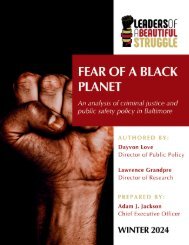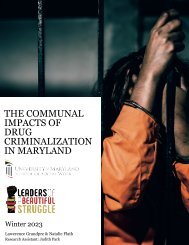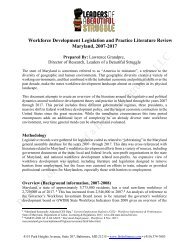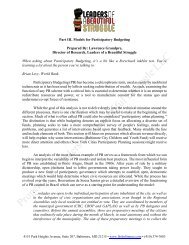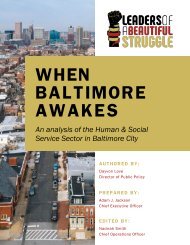Drug Decriminalization in Maryland Through an African Centered Research Paradigm- Analysis and Recommendations
This document offers guidance for theorizing questions related to a proposed research project purposed to advance drug decriminalization in Maryland.
This document offers guidance for theorizing questions related to a proposed research project purposed to advance drug decriminalization in Maryland.
- No tags were found...
Create successful ePaper yourself
Turn your PDF publications into a flip-book with our unique Google optimized e-Paper software.
of slavery <strong>an</strong>d <strong>in</strong>stitutional racism on not only the economic conditions of Afric<strong>an</strong>-<br />
Americ<strong>an</strong> families but also the psychosocial function<strong>in</strong>g <strong>an</strong>d well-be<strong>in</strong>g of these families.<br />
If subst<strong>an</strong>ce abuse is viewed partly as a reaction to severe psychosocial stress <strong>an</strong>d<br />
economic albatrosses, the opportunities provided by affirmative-action policies might help<br />
to dim<strong>in</strong>ish subst<strong>an</strong>ce abuse <strong>in</strong> the Afric<strong>an</strong>- Americ<strong>an</strong> community. Hence, future research<br />
should exam<strong>in</strong>e the impact of enh<strong>an</strong>ced educational <strong>an</strong>d employment opportunities on<br />
Afric<strong>an</strong> Americ<strong>an</strong>s' level of subst<strong>an</strong>ce use <strong>an</strong>d abuse.<br />
The latter recommendations focus on the victims of racial oppression, but what about the<br />
political <strong>an</strong>d economic beneficiaries of racial oppression? S<strong>in</strong>ce it was argued that their<br />
privileged status c<strong>an</strong> place them at risk of subst<strong>an</strong>ce abuse, what c<strong>an</strong> be done to alleviate<br />
the fear, <strong>an</strong>ger, <strong>an</strong>d guilt associated with this privilege that c<strong>an</strong> contribute to subst<strong>an</strong>ce<br />
abuse? Fundamentally, the system of racial oppression has to be elim<strong>in</strong>ated to completely<br />
destroy these feel<strong>in</strong>gs. Although the abolition of racial oppression may take just as long as<br />
its creation <strong>an</strong>d evolution, a few steps c<strong>an</strong> be taken that might help ease, but perhaps not<br />
elim<strong>in</strong>ate, these feel<strong>in</strong>gs, particularly those of fear (i.e., <strong>an</strong>xiety) <strong>an</strong>d guilt.” (Schile, 2013).<br />
Jerome Schiele presents a summation of the research of Kobi Kambon, who argues that<br />
programm<strong>in</strong>g which promote what he called <strong>an</strong> “Afric<strong>an</strong> self-consciousness” (ASC) could have a<br />
protective effect for Black people <strong>in</strong> relation to addiction, writ<strong>in</strong>g:<br />
“The Afric<strong>an</strong> self-consciousness (ASC) construct, discussed <strong>in</strong> the last chapter, c<strong>an</strong> be<br />
employed as <strong>an</strong> <strong>in</strong>dicator of <strong>an</strong> Afric<strong>an</strong> Americ<strong>an</strong>'s level of group commitment to other<br />
people of Afric<strong>an</strong> descent when one exam<strong>in</strong>es the four dimensions of the construct<br />
presented by Kambon (1992, p. 56):<br />
1. Awareness of one's Afric<strong>an</strong> identity (a collective consciousness) <strong>an</strong>d Afric<strong>an</strong> cultural<br />
heritage, <strong>an</strong>d sees value <strong>in</strong> the pursuit of knowledge of self.<br />
2. Recognition of Afric<strong>an</strong> survival <strong>an</strong>d positive development as one's number one priority.<br />
4151 Park Heights Avenue, Suite 207, Baltimore, MD 21215 • www.lbsbaltimore.com • (410) 374-7683




